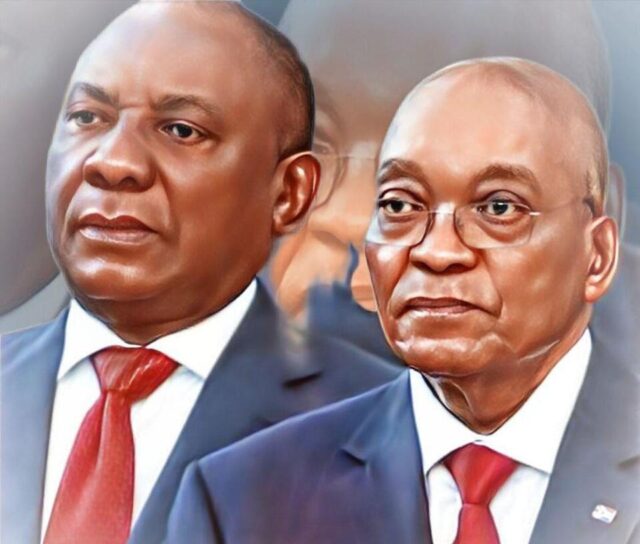Jacob Zuma says the urgent court application to interdict his private prosecution of President Cyril Ramaphosa will test ‘whether Lady Justice has removed her blindfold in South Africa’.
JOHANNESBURG – Jacob Zuma says Tuesday’s urgent court application to interdict his private prosecution of President Cyril Ramaphosa will test “whether Lady Justice has removed her blindfold in South Africa”.
“There cannot be one law for Zuma and another law for Ramaphosa if the rule of law and equality before the law are still the guiding principles of our justice system,” Zuma said on Friday in his replying affidavit to Ramaphosa’s court application to avoid appearing in the criminal court on Thursday, January 19.
He said that even the late former president Nelson Mandela was hauled before a court for cross-examination when it was then unprecedented for a head of state to do so. “The sky did not fall. The sun rose from the East and set in the West.”
He said Ramaphosa was capable of obtaining effective relief in due course before the scheduled criminal trial. “There is no dying infant. There is no blood being spilt. There is no reason to give [Ramaphosa] preferential treatment over other accused persons, simply because he happens to be president. There is no separate law for presidents (or even former presidents) and another law for ‘ordinary’ people.”
Zuma brought the criminal case against Ramaphosa on charges of being an accessory to the fact or defeating the ends of justice. Zuma alleges that Ramaphosa failed to act following an incident where the National Prosecuting Authority (NPA) allegedly unlawfully leaked his medical records to the media.
He said Ramaphosa was specifically mentioned in the docket of the case against NPA prosecutor Billy Downer SC and Media24 journalist Karyn Maughan. “The alleged principal crimes were committed on 9 August 2022, the accessory crime was committed after 25 August 2022 (ie, after the commission and completion of the principal crime) and the charges were laid with the police on 21 October 2022.”
According to Zuma’s court papers in the high court in Johannesburg, Ramaphosa’s application to block the private prosecution was based on the claims of an improper motive and political conspiracy. Ramaphosa also claimed that the private prosecutor, Zuma, lacked standing to try the criminal case.
“Incidentally, when I recently launched a similar attack on the prosecutor’s title to prosecute … a judgment was granted against me mainly on the basis that such a challenge should be brought during or at the end of my criminal trial.”
Zuma continued: “My appeals against that ruling on grounds including the issue of the appropriate stage at which such a challenge ought to be determined were serially dismissed by the SCA and the Constitutional Court on four separate occasions.”
He said there was also case law which “puts it beyond doubt that an improper motive is not an adequate ground for escaping prosecution”. He said 10 years ago, the Supreme Court of Appeal (SCA) declined to review and set aside a decision by the NPA to prosecute him based on similar allegations of a political conspiracy.
“My case was not materially different from the case now advanced by the applicant in this court. I said at the time that the NPA’s decision to prosecute me was politically motivated,” Zuma said.
The SCA said then that “a prosecution is not wrongful merely because it is brought for an improper purpose. It will only be wrongful if, in addition, reasonable and probable grounds for prosecuting are absent … ”
Zuma said he was determined to ensure that Ramaphosa faced the might of the law.
“For the avoidance of any doubt, I demonstrate below and categorically that my sole intention is to secure conviction and punishment of the applicant. The offence for which he is charged carries the possible heavy penalty of 15 years imprisonment. It is no light matter.”
He said: “For the record, even if [Ramaphosa] may be temporarily and erroneously allowed to escape by the employment of technicalities and his other delaying tactics, all that will happen will be to address those technicalities and eventually to pursue his inevitable conviction. Nothing will deter me, as the victim, from the ultimate goal of the attainment of justice against all those who have criminally participated, directly or indirectly, in my deliberate humiliation at the hands of my prosecutors turned persecutors.”
Zuma said Ramaphosa’s attack on his private prosecution was no different from his case more than a decade ago. “If indeed all are equal before the law, he should be treated in the same way I was and as all other accused persons are daily treated in our criminal courts. Given the binding precedent of the apex court and the SCA in substantially similar circumstances, the question that now faces this court is this: does the president of the country get presented with a get-out-of-jail-free pass which is premised on an alleged ulterior motive, just because he is the president who enjoys the support of the mainstream media which, by design, influences public sentiment towards or against certain political players depending on their political and economic views?”
Zuma was wary that the interdict application could be “judged as a mainstream media popularity contest between a media-maligned former president and the incumbent based on public perceptions of what each represents”.
“All these questions will ring in the minds of ordinary South Africans – and rightly so, given South Africa’s current political landscape where people perceived as ‘opponents’ of [Ramaphosa] tend to be politically targeted,” he said.
He said that he was “wrongly associated in the mainstream media and others who harbour personal animosity” towards him, including Ramaphosa, with “state capture” and “nine wasted years” even though Ramaphosa ”was my loyal deputy” for a substantial period and was the leader of government business including state-owned enterprises in which the alleged “state capture” was supposed to have occurred.








